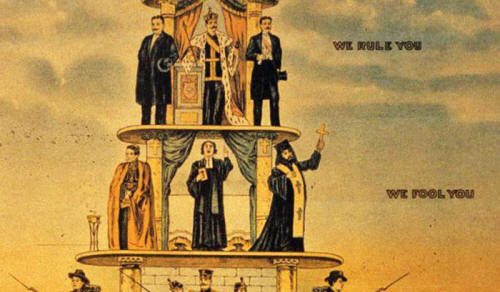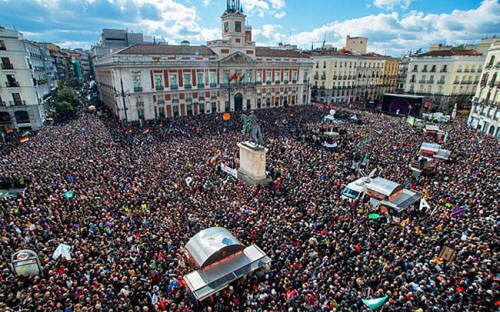|
from Collective-Evolution Website
The IMF's chief economist,
Raghurum Rajan, presented a paper
to the men in charge of all the world's major banks, including
the
Federal Reserve, warning of the potential collapse of the system due
to dangerous incentives, and journalist Allan Sloan published
articles in Fortune magazine and The Washington Post in 2007 -
nothing was done.
The Effect
Seven years later and, as you read this, home foreclosures are still on the increase in many US states, the Chinese stock market is teetering on the edge of its own financial meltdown, austerity measures are intensifying in the UK, and the European Union is not unrealistically on the verge of falling apart.
The ever more concentrated power that forms from a system based on a motive of profit before people, planet, morals and ethics is leading many, like me, to investigate new political alternatives.
Podemos
supporters gather in Madrid, Spain.
New left-wing socialist parties, such as, ...are rising up from the financial ruin of the hardest hit countries, and the socialist debate is picking up serious momentum in the USA, too.
July 2015, and Greece's new left-wing party Syriza gave the people of Greece the option to vote on continued austerity measures and increased bailouts from Germany and the EU.
Since all the bailout money is only going into paying off interest on the debt that Greece already has - whilst at the same time creating even more debt for Greece thanks to the interest charged on the bailout money itself - for the first time since the Eurozone was created in 1999, people have united en masse to stand up against the irresponsible behavior of banks and politicians and said 'no.'
However, this is not the first example of people power since the crisis began.
The first rebellion took place in Iceland. People flocked to the streets in protest after the government let the banks borrow 10 times Iceland's GDP and then left the people of Iceland with a debt to income ratio of 240%.
Ongoing demonstrations that included stones thrown at the parliament building led to a relatively peaceful revolution; the prime minister was indicted, Iceland's main bank was nationalized, 200 criminal charges were made against the bankers, and debt exceeding 110% of home values was simply wiped clean.
The media has largely ignored these two events, but one event that the global media could not ignore was when thousands of people poured onto the streets in the Wall Street financial district in 2010 demanding a new, humane, sustainable system.
As demonstrations rapidly spread to some 840 cities in the US, and many cities in Europe and Asia, the media was quick to demonize the movement - until finally the demonstrating fizzled out.
It therefore may seem that the efforts of Occupy Wall Street were perhaps all in vain, but this is not the case.
The Revolution
Oxfam recently released a report that by 2016, 1% will own more wealth than all the rest of the people on planet earth.
The Occupy Movement is the reason that the idea of the 99% is now in the public debate.
Occupy Wall Street may have fizzled out, but Occupy Together was formed; global solidarity of the 99% is increasing exponentially, new radical left-wing parties are surfacing, new coalitions are forming, and an ever increasing number of demonstrations are taking place, en masse, all over the world.
It is just that the mainstream media is not talking about it - but global revolution is already taking place.
This June, for example, more than 250,000 people from all walks of life and political persuasions took part in a unified anti-austerity march that occupied the streets of London here in the UK - but there was nothing about it on the news.
As I continue to develop my project Wake Up World Education, and its aim to encourage rapid positive social change through education, I have been inspired by all of these events to create a short documentary as the third episode of my Truth Behind Politics series:
Video also HERE...
The documentary critiques capitalism and its flaws and encourages people to move their money out of the big banks and join the movement for social change.
In just 30 minutes, it covers,
...and asks the audience one main question:
Was Karl Marx right?Is capitalism on the verge of collapseand a positive new community-based social systemcoming to fruition in its wake?
|



